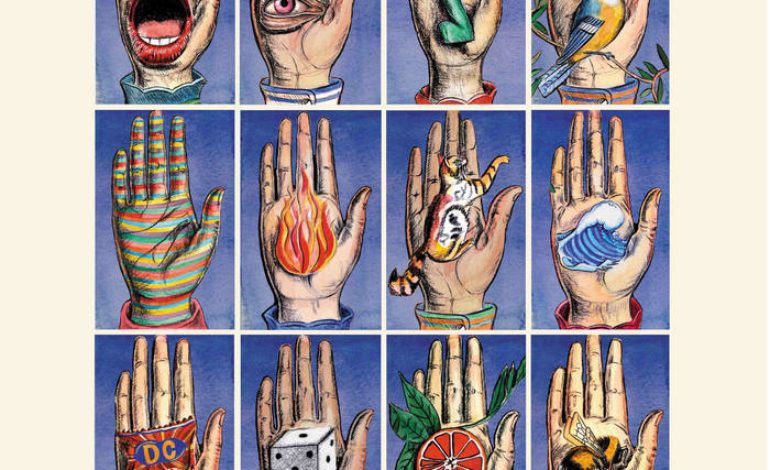

Ironically, it’s an album that will make people feel more alive
Tunng is back with their newest album Dead Club, and it certainly wasn’t made for the faint of heart. This isn’t because of the sound—which is actually quite soft and comforting most of the time—but rather the lyrical compositions of the songs themselves. Each track intimately dissects the subject of death, leaving no stone unturned in the imagination. From researching cultures around the world to full-on speeches regarding the subject of death and decay, Tunng certainly wanted to start a conversation in Dead Club.
The concept itself extends beyond the album, as Tunng also created a podcast series entitled Dead Club, in conjunction with a series of artwork centered around the motif. That isn’t to say the instrumental production of the album was lacking, the very opposite is true. Tunng is notorious for infusing peculiar elements into their work, creating a delightful sound that can only be described as “Folktronica.” Though Dead Club examines the deep nuances of a morbid motif, the instrumental composition of the album shifts the conversation of death from frightening to accepting, using a clarinet, lively piano, guitar and a variety of strings from track to track to produce a surprisingly effervescent feeling.
One of the most enthralling components of Dead Club is the conversational tone that builds throughout the album. It is this tone that almost insists the listener has a response, if not aloud at the very least in their own mind. Every song is fresh and thought-provoking because Tunng ensures things remain dynamic from start to finish. The album begins with “Eating the Dead,” where slow, distorted synths instantly inspire a sense of mystery, followed by the soft strokes of a piano that builds suspense in the listener. The piano makes the song hypnotic and enchanting as a voice delivers a speech on death, stating “death as I experience it is other people’s death,” elaborating on the peculiarity that death cannot be felt or experienced in oneself, just witnessed in the passing of others.
Every song explores death in great detail, and some songs are simply stories in their own right with instrumentation behind them, like in “Man” and “Woman.” This was actually the intention, as Max Porter assisted Tunng by writing both the stories showcased in the aforementioned songs. The conversational tone of the album is set to masterfully mixed instrumentation, and though many of the same instruments were used from track to track, no two songs sound alike. From the creative violin plucking that kicks off “SDC” to the slow-paced piano beautiful enough to bring one to tears in “Carry You,” Dead Club is ironically filled with life and soul.
Obviously, as aforementioned, the lyrical prowess the band possesses cannot be ignored, especially when it was so heavily informed by careful research and collaboration from a wide variety of industry experts with a relation to death. For instance, in “SDC” the group collectively sings “we are Swedish death cleaning,” referring to a practice where the elderly in Sweden get rid of their physical belongings to make it easier on their family when they pass. The conversations taking place throughout Dead Club can be so intimate that at times it almost feels like the album itself is practicing the art of Swedish death cleaning.
Not all the lyrics are as easily discernible or understood, such is the case in the song “Three Birds.” A slow, soft acoustic guitar starts off the track, and the addition of distorted synths as the lyrics become creepier give the song an extra edge, with soft feminine and masculine whispers quietly singing “she shot down the birds/ tied the feathers into her curls/ sewed the skins into a purse/ to carry their hearts and vocal cords” as if it were a soothing lullaby. The song is almost a reminder the influences of death can grasp someone at any age, leaving the listener a bit unsettled, but thankful for the honesty of Dead Club.
Perhaps one of the funniest songs on the track is “The Last Day,” opening to a woman stating “what a waste of a life if what you’re worried about is coming at the other end and where you’re going to go because I firmly believe the life switches off,” begging the listener to take full advantage of being alive in the present moment. Tunng then begins to list a series of items, singing “tree/ this could really be the last tree of your life,” repeating the same lines for “book,” “kiss” and so on. While it certainly is witty, it does make the listener appreciate the small things.
Overall, Dead Club is wonderfully eccentric and its morbidity certainly isn’t a detractor from the album. If anything, the honest acknowledgment and discussion of death is refreshing in a time where it feels like the most trivial things can make life seem overwhelming. While the band themselves dedicated Dead Club to anyone who is grieving, the album can teach anyone anything, especially since it makes one confront what fate they will ultimately meet.
